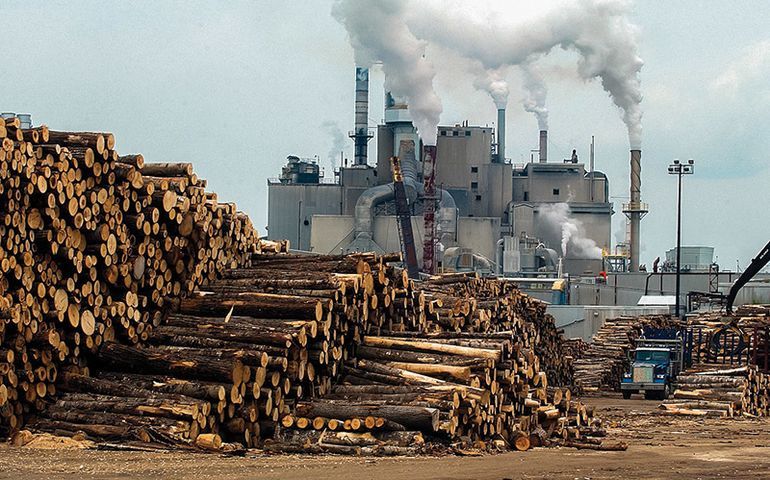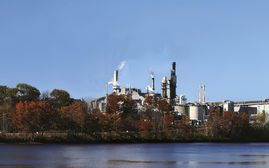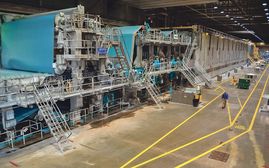Processing Your Payment
Please do not leave this page until complete. This can take a few moments.
- News
-
Editions
View Digital Editions
Biweekly Issues
- December 15, 2025
- December 1, 2025
- Nov. 17, 2025
- November 03, 2025
- October 20, 2025
- October 6, 2025
- + More
Special Editions
- Lists
- Viewpoints
-
Our Events
Event Info
Award Honorees
- Calendar
- Biz Marketplace
As it sells its Jay paper mill, Verso tries to stave off a corporate coup
 File photo
Verso Corp., which is selling its mill in Jay and another in Wisconsin for $400 million, is maneuvering to avoid a takeover attempt by a group of private investors.
File photo
Verso Corp., which is selling its mill in Jay and another in Wisconsin for $400 million, is maneuvering to avoid a takeover attempt by a group of private investors.
Verso Corp. (NYSE: VRS), which is in the midst of selling its paper mill in Jay, is now in the midst of defending itself from an attempted takeover.
It’s not clear if the corporate chess game will affect the sale of the mill and another in Wisconsin for $400 million to Pixelle Specialty Solutions LLC, a Pennsylvania producer of specialty paper. But Verso has nominated a new director for its board — and will soon propose another — as alternatives to a slate proposed by an investor group that's trying to gain control.
In a news release Tuesday, the board said it is recommending for election paper industry veteran Robert K. Beckler, who most recently was president of packaging solutions for Atlanta-based WestRock Co. (NYSE: WRK). Another nominee will be announced by Tuesday.
Verso Co-Chairmen Alan Carr and Gene Davis will not stand for re-election to the board at the company’s annual meeting on Jan. 21, according to the release.
Board member Steven Scheiwe, who is expected to become the sole chairman at the meeting, said in the release, "We are very pleased to nominate Dr. Beckler for election to the board. He brings a wealth of paper industry experience and will bring strategic guidance that I am confident will benefit the company and contribute to its future successes.”
Carr and Davis said their decisions to stand down were related to the competing slate offered by a group of three private equity firms, Atlas Holdings, Blue Wolf Capital Advisors and Lapetus Capital. Together, they own nearly 10% of outstanding Verso stock.
The group has made several unsuccessful bids to acquire the Miamisburg, Ohio-based company since 2017. Last week, the firms filed a proxy statement for three director nominees, each of whom the board had previously rejected. A compromise proposal and counter-proposal have both been rejected.
Carr and Davis said in the release, "We believe that [the investor group] spurned bidders that have made several attempts to own or control the company, have chosen to pursue a proxy fight in order to further their continued efforts to obtain control of the company and its prospects. We have many significant stockholders and Atlas' demands are unfair to them, indeed, all of our stockholders, and defy accepted corporate governance standards under law and as published by proxy advisory firms.
“In order to mitigate the waste of time, expense and distraction to the company, each of us has determined to withdraw our name for consideration of re-election. With our newly refreshed board and board nominee slate, comprised of highly qualified candidates with diverse skill sets and devoid of conflict, we are confident that the best interests of our stockholders are being and will be well-served.”
Attempts to reach representatives of the investor group for comment were unsuccessful.
The sale of the Androscoggin Mill, which has about 400 employees and began operations in 1885, is expected to close during the first quarter of 2020.
The price of Verso shares declined slightly since Tuesday, but on Thursday morning had risen to over $18.84, roughly their previous level.
Mainebiz web partners
Related Content

The Giving Guide
The Giving Guide helps nonprofits have the opportunity to showcase and differentiate their organizations so that businesses better understand how they can contribute to a nonprofit’s mission and work.
Learn More
Work for ME
Work for ME is a workforce development tool to help Maine’s employers target Maine’s emerging workforce. Work for ME highlights each industry, its impact on Maine’s economy, the jobs available to entry-level workers, the training and education needed to get a career started.
Learn More
Groundbreaking Maine
Whether you’re a developer, financer, architect, or industry enthusiast, Groundbreaking Maine is crafted to be your go-to source for valuable insights in Maine’s real estate and construction community.
Learn more-
The Giving Guide
The Giving Guide helps nonprofits have the opportunity to showcase and differentiate their organizations so that businesses better understand how they can contribute to a nonprofit’s mission and work.
-
Work for ME
Work for ME is a workforce development tool to help Maine’s employers target Maine’s emerging workforce. Work for ME highlights each industry, its impact on Maine’s economy, the jobs available to entry-level workers, the training and education needed to get a career started.
-
Groundbreaking Maine
Whether you’re a developer, financer, architect, or industry enthusiast, Groundbreaking Maine is crafted to be your go-to source for valuable insights in Maine’s real estate and construction community.
ABOUT
NEW ENGLAND BUSINESS MEDIA SITES
No articles left
Get access now
In order to use this feature, we need some information from you. You can also login or register for a free account.
By clicking submit you are agreeing to our cookie usage and Privacy Policy
Already have an account? Login
Already have an account? Login
Want to create an account? Register
Get access now
In order to use this feature, we need some information from you. You can also login or register for a free account.
By clicking submit you are agreeing to our cookie usage and Privacy Policy
Already have an account? Login
Already have an account? Login
Want to create an account? Register










1 Comments